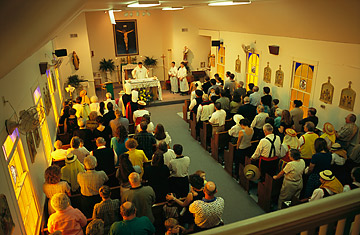
Worshipers celebrating daily mass, Delacroix Island, Louisiana.
Back in Christianity's early days, petty semantics could cause powerful schisms. A big reason the western and eastern churches split was a bitter dispute over the addition of three words, "and the Son" (in Latin it was one word, "filioque") to the 4th-century statement of Christian belief, the Nicene Creed.
But if you thought modern Christendom was beyond that kind of medieval nonsense, think again. Despite all the really weighty issues Roman Catholics face, including the latest sexual abuse scandal playing out in Philadelphia, the most passionate debate this year may well be whether the Nicene Creed should say "one in Being with" or "consubstantial with." That's because the Vatican plans to introduce a new English-language Roman Missal, the prayer script we Catholics use at Mass — and its awkward changes to prayers and the liturgy are raising a chorus of complaints from priests and the laity. It's tempting to dismiss the clash with the old saying about fights inside academia: they're so fierce because the stakes are so low. But the Catholic missal melee is unfortunately a reminder that the tiresome practice of theological hairsplitting is still alive and well in the 21st century.
The source of the fuss, like so much Catholic dysfunction today, is Vatican II. That modernizing 1960s church council reformed the Catholic liturgy, allowing Mass to be said in the more accessible vernacular instead of Latin. But one of its more tedious byproducts was the way it emboldened liturgical liberals — the Kumbaya crowd, who often turn Masses into hand-holding, guitar-strumming services that even progressive Catholics find grating — and how it embittered conservatives, including Pope Benedict XVI, who want to take the Mass back, at least partway, to the Latin of the more rigid and remote Tridentine tradition.
The Vatican's new missal in English, which debuts next November at Advent, is a result of that conservative backlash. Even if it doesn't restore the Latin, it requires the vernacular to be as faithful a translation of the Latin as possible. And that's where the trouble starts, not just for Catholics but also for English majors. It's sad when Rome's cassocked scholars subordinate their intellectual gifts to church expediency. The specious logic they use to justify an all-male priesthood (none of Jesus' apostles were women, they argue) is one example, and the new missal seems another. The Vatican boasts some of the world's most talented linguists, yet their missal revision commits a cardinal sin of translation: forcing the square peg of one language into the round hole of another.
Take one of the changes in the Nicene Creed, which Catholics recite at Mass. The current Creed says Jesus was "born of the Virgin Mary;" the new missal turns that into "incarnate of the Virgin Mary." That might be more faithful to Latin, but it betrays good English. You don't have to be Shakespeare to realize that "born of the Virgin Mary" isn't just more sensible but more rhythmic. I can understand the urge to reflect the core idea of our faith — God's incarnation here among us — but I doubt the new sentence will evoke that mystery for most Catholics. It will evoke clumsy English — and in the process detract from the beautiful idea. The same goes for the Creed's new description of Jesus as "consubstantial with the Father" instead of "one in Being with the Father." That's not thoughtful translation; that's just theological arrogance.
But don't let the Kumbaya crowd off the hook, either. Their own arrogance — and some of Vatican II's own bad translations — helped provoke the backlash. Consider what's known as the "people's prayer," a dash of humility uttered just before Catholics take communion. The Vatican II version says, "Lord, I am not worthy to receive you," but that’s a lame rendering of the Latin version, which in English should say, "Lord, I am not worthy to have you under my roof." This matters because the prayer was originally inspired by one of the New Testament's most poignant moments, when a Roman centurion asks Jesus to help a dying servant but frets that he's not worthy to have Jesus enter his home. That story is precisely why the prayer became part of the Mass in the first place — to remind us that we're every bit as flawed as the Roman soldiers who crucified Jesus — and it’s why the Vatican II revisionists shouldn't have sapped the prayer of its meaning and poetry. The new missal restores the meaning — but unfortunately it butchers the poetry by ramming the Latin subjunctive into English: "Lord, I am not worthy that you should enter under my roof."
The prayer actually is lovely in Latin: Domine, non sum dignus ut intres sub tectum meum. Which is a reminder that perhaps we could have avoided the Vatican's clunky new English if the liberals hadn't sought to obliterate Latin from the Mass. Yes, the all-Latin Tridentine Mass, with the priest's back turned to the congregation, had to go. But even Reform Jews incorporate Hebrew in their vernacular services; and if Vatican II had made some space for Latin and Greek — the Kyrie, Agnus Dei and other simpler chants, for example — Catholics too could have retained a transcendent link to our faith's ancestral languages, while at the same time placating the church's conservatives.
Either way, we Catholics look a little foolish right now — and not very Christ-like. Jesus was a master of simple but beautiful parables told in simple but beautiful language: he knew better than to substitute "incarnate" for "born." And he knew there are better things to fight for than petty semantics.
